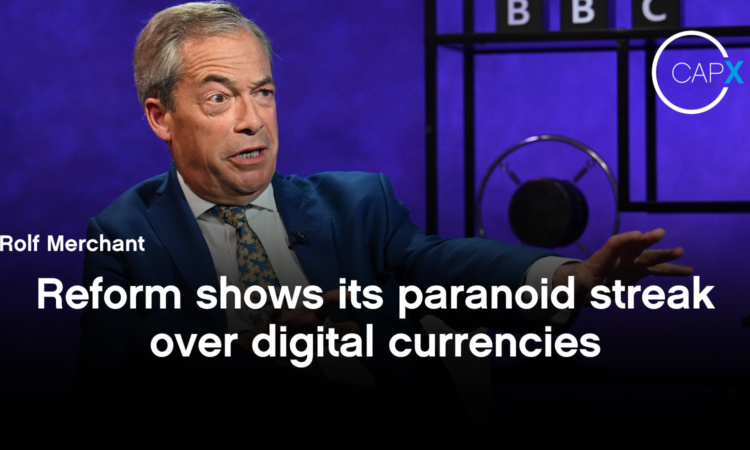
Skimming through Reform UK’s ‘Contract With You’ – its manifesto in all but name – I came across something odd. It was so out of place it stuck out like a sore thumb.
In the section about ‘reaffirming British sovereignty’ there lies a pledge to oppose the creation of a central bank digital currency (CBDC). In the same paragraph Reform says it will ‘reject the influence of the World Economic Forum’ and threatens to leave the World Health Organisation unless it undergoes fundamental reform.
The whole section smacks of the paranoid streak in Reform’s politics. Judging from some of Nigel Farage’s social media posts, he seems to think there is a global cabal of supranational organisations determined to thrust various ‘digital things’ onto the world’s population. It is all in the cause, this line of thought seems to imply, of creating some sort of evil database, invading people’s privacy and leading to overbearing control – national or supranational.
These kinds of government-led innovations have come under attack from several right-wing populist parties. Germany’s AfD has agitated against the digital Euro project, claiming it is a step towards the EU running ‘unlimited surveillance’ of citizens. In the US, Ron DeSantis pledged to ban CBDC during his abortive campaign to be Republican presidential nominee. As Governor of Florida, he signed a bill to prohibit use of CBDC in the state to protect Floridians from ‘government overreach and woke corporate monitoring.’
The merits of CBDCs are certainly up for debate. By using blockchain to create a digital-only currency, they have the potential to make payments systems far cheaper, more efficient, and combat fraud. However, questions remain about their potential impact on financial stability, together with the wider commercial banking system, and whether they spell the death of cash and consumer choice.
Nevertheless, it is interesting to see political parties – now including Reform – focus on this kind of little known and little understood issue, and demand to have it thrown out entirely.
CBDC has generated some debate among regulators and politicians, but it’s certainly not something talked about in the pubs and clubs of Britain. Perhaps that’s the point for populists: they argue it is another example of the ‘elitist blob’ creating something bad and not bothering to tell you about it until it is a fait accompli.
To be fair to Farage and co, there is something in that argument. No one has yet made a serious effort to persuade our elected representatives or the wider public about what benefits CBDCs could bring.
But the rise of populist tech-scepticism should worry the European tech fraternity. If parties like Reform make such policies more mainstream, it could spell bad news for a whole host of technological innovations and the tech sector at large.
The logical extension of rejecting something like CBDC is to say no to many other mooted digital services that could improve our lives, the function of businesses large and small, and the workings of the state.
Digital ID – a secure, digital only means of proving you are who you say you are – already panned by Farage as a globalist plot, would be next in the firing line. This is despite the fact digital ID would make everything from opening a bank account to buying a house or using government services much easier and more efficient. It would also make it incredibly hard for illegal immigrants to live and work in countries to which they have entered without permission, a principal concern of populist parties.



